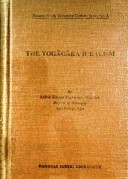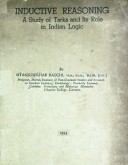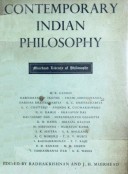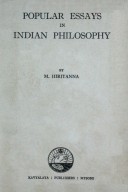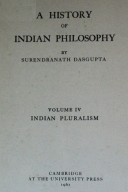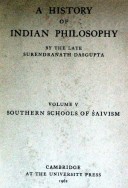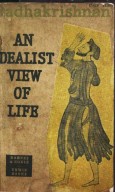Tìm Sách
Sách tiếng Anh-English >> The Yogacara Idealism
Thông tin tra cứu
- Tên sách : The Yogacara Idealism
- Tác giả : Ashok Kumar Chatterjee
- Dịch giả :
- Ngôn ngữ : Anh
- Số trang : 307
- Nhà xuất bản : Banaras Hindu University
- Năm xuất bản : 1962
- Phân loại : Sách tiếng Anh-English
- MCB : 1210000004836
- OPAC :
- Tóm tắt :
FOREWORD
The Yogãcãra-Vijnãnavãda Idealism was die last great creative synthesis of Buddhism, and its position in that tradition is comparable to that of the Advaita Vedãnta in the orthodox Hindu tradition. It is perhaps the only original epistemological idealism to be formulated on the Indian soil. Its impact on the other systems of thought was tremendous. Even those philosophies that were completely out of line with idealism, like the Nyãya, the Mĩmãmsã and Jainism, had to reckon with it. Considering the important role played by the Yogãcãra Idealism in Buddhism and in Indian philosophical and religious thought in general, it is surprising that there had been no full or reliable expositions of this philosophy. This gap in our knowledge is admirably filled by the present work of Dr. Chatterjee.
The author deals with the Yogãcãra-Vijnãnavãda in all its aspects and bearings, historically, analytically and comparatively. The first two chapters of the book show, with great clarity and sufficient detail, the origin and development of the Yogãcãra idealism as an outcome of those fruitful and dynamic ideas associated with the previous schools of Buddhism, especially with the Sautrãntika and the Mãdhyamika. The originality of the Yogãcãra synthesis of Buddhist teachings has been clearly brought out, and the individual contribution made by the philosophers of this school, such as Asanga, Vasubandhu, Stbiramati, Dignãga, Dharmakĩrti and Sãntaraksita, has received adequate attention.
The subsequent chapters, which form the core of the work, represent a constructive and critical exposition of the Yogãcãra metaphysics, its idealism and absolutism as well as its spiritual discipline. Dr. Chatterjee has utilised nearly all the sources available on the subject and has given a faithful and persuasive account of this system of thought. He has not hesitated to go behind the literal meaning of the texts to extract their real significance. There is a measure of risk in such a venture, and at some places one might choose to disagree with the authors’s interpretation. However, the duty of a scholar is not just to reproduce literally, but to reinterpret and to re-construct his theme.
Comparison of the Yogãcãra with other forms of idealism and absolutism, Indian as well as European, has been undertaken in the last two chapters of the work. This serves to bring out the affinities and distinctions which are only too often blurred. These comparative studies are among the best specimens of the author’s keen analysis and lucid exposition.
I cannot help feeling that the work of Dr. Chatterjee would have gained considerably more in comprehension and authoritativeness if the Yogãcãra texts in Chinese and Tibetan or their translations in French had been made use of more fully. I have no manner of doubt, however, that the work of Dr. Chatterjee, even as it stands, will prove a valuable and outstanding contribution to our understanding of a very important phase of Indian thought. It is an excellent piece of philosophical writing, both with regard to the range of problems covered and the delightful manner of presentation. There is hardly any dull or unstimulating page in a work of 300 pages.
It is a matter of personal gratification to me that the line of thought initiated by me in dealing with the basic philosophy of Buddhism in my study of the Mãdhyamika system (The Central Philosophy of Buddhism, George Allen & Unwin, London, 1955) has been largely accepted and carried out by my student and friend, Dr. Ashok Kumar Chatteijee. His study of the Yogãcãra Idealism may well be considered as a sequel to my book on the Mãdhyamika Absolutism which together constitute the revolutionary Mahãyăna movement.
T.R.V. Murti
General Editor,
B.H.U. Darsana Series.
PREFACE
An attempt is here made to expound the metaphysics of the Yogacãra school of Buddhism and to analyse its logical implications. It may not be rash to think that little apology is needed for making such an attempt. The expositary literature on the Yogãcãra system is plentiful, but unfortunately, not adequate. Scholarly studies on the subject from the historical point of view are not lacking. There is hardly any work, however, which treats of the system as an original contribution to philosophy. At best, it is construed as a phase in the historical development of Buddhism. The account of the Yogãcãra philosophy given in the standard histories of Indian thought is necessarily all too meagre. The details cannot be discussed with sufficient fulness within the limited space in such works. Treatises devoted entirely to the exposition of Buddhism fare no better. The analysis is sometimes positively misleading. The Yogãcãra is described merely as idealism. For a correct appraisement of the system it is very necessary to remember that it is a form of absolutism. This is the central problem in the Yogãcãra philosophy—the problem of effecting a logical synthesis between idealism and absolutism. The Yogacãra is wise enough to perceive that idealism, when pressed, yields an absolutism by the sheer dynamism of its own inner logic. This point needs bringing out with sufficient deductive clarity. In the existing accounts this point is not utterly lacking, but it is hardly given that attention and emphasis which it demands. The late Stcherbatsky was a notable exception which only proves the general statement.
Other constructive details also of the system have not been fully analysed. In the present essay I have simply tried to present a more or less complete picture of the system, to collect the scattered details into a coherent connected picture and to size it up, not merely as a phase of Buddhism, but rather as an original and constructive philosophy. Completeness has been with me more an ideal than an actual achievement. I have neither the soundness of scholarship nor the maturity of judgment required for this. Certain omissions are however deliberate. The first chapter professes to be a historical introduction to the Yogãcãra metaphysics, but history, in its popular sense of chronology of dates and events, will not be found there. Not that such a chronological study is uninteresting or unimportant; it is simply that in a morphological analysis of any metaphysics, chronology of dates and events is absolutely beside the point. In the present essay I have attempted to show that the Yogãcãra philosophy is a logical elaboration of the basic epistemological pattern of Buddhism. The first chapter is a history of the gradual development of the fundamental logic of Buddhism, culminating in the Yogãcãra idealism. The omission of actual chronological details appeared excusable, and is deliberate.
For the same reason, minor doctrinal differences, if any, between various Yogãcãra ãcãryas, have not been discussed. I have taken Vasubandhu’s Vijnaptimatratasiddhi as the basic work on the system. Other texts are consulted only as throwing light on the problems raised in that treatise. The other omission is regarding the insufficient space devoted to the 8th and 9th chapters, dealing with the discipline and the religion of the Yogãcara system. In a strictly metaphysical essay, they could very well be deleted. I have said a few words only for the sake of completeness. Here also the shifting of emphasis away from these problems appeared to be justifiable, though I do not know how far this point of view is really justified. All that I ask is to have the essay judged purely on its merits as a philosophical analysis, and not as a piece of historical survey.
As regards the plan of the essay, the first two chapters are more or less historical. The first chapter discusses how the Yogãcãra school emerged out of the inner dynamism inherent in Buddhism from the very outset. The second chapter is devoted to the important acãryas, texts, sub-schools, and other such minor details. These two chapters are in no way integrally related with what follows.
The third and fourth chapters analyse the epistemological basis of the system. The third is concerned with the refutation of the category of the objective, and in the fourth realistic arguments are considered from the Yogacãra standpoint. The fifth chapter sets forth the elaboration of the Yogãcãra idealism as a constructive metaphysics, and attempts to show how consciousness, the sole reality, is actually diversified’-into the multi-dimensional forms of the so-called empirical world. The sixth chapter is again a concession to the ideal of completeness. It deals with the Dharma-theory, a doctrine of central interest in entire Buddhism, as adapted by the Yogãcãra.
The seventh chapter attempts to analyse the Yogacãra metaphysics as a form of absolutism. This problem can certainly be said to represent the very heart of the system. All the other details are to be understood as leading upto this logical climax. To this chapter is added a section on the doctrine of Three Truths.
The last two chapters are comparative, and as such, do not materially add to the understanding of the system. They are included in order to make clear the spiritual affinities and differences between the Yogãcãra and other allied schools of idealism and absolutism. For this purpose, Berkeley and Hegel are selected as representing different forms of idealism. I had intended to add a section on Lelhnita too, but had to refrain from doing so because of considerations of space. A section on Gentile is added however as an appendix to that on Hegel. The Advaita Vedanta and the Mãdhyamika are chosen as two other definitive forms of absolutism.
A few words may be said about the use of the term ‘idealism’ in the present essay. Idealism is so ambiguous a term and is employed in metaphysics in so many totally different senses, that its use might lead to gross misunderstanding unless it is defined with great precision at the very outset. Some scholars choose to understand it in a very loose manner. Prof. S. N. Dasgupta, for example, says, “I shall call my theory idealistic which asserts that ‘Reality is spiritual’……. Idealism is not committed to any particular kind of epistemological doctrine….. the concern of the idealist is with regard to the assertion of the nature of reality, and it is not difficult to conceive that there should be an idealism which is largely in agreement with some forms of realism in the field of epistemology but may yet be thoroughgoing idealism.” I venture to think that epistemology is a more primary discipline than ontology, and idealism therefore should essentially be understood in an epistemological sense. Any theory of reality presupposes a theory of knowledge by which it is determined, Nothing can be asserted about the nature of reality unless certain assumptions are tacitly made regarding the nature of knowledge. Prof. Dasgupta’s contention that idealism is committed to the doctrine “Reality is spiritual” would include as idealistic systems like those of Ramanuja and Nimbãrka, while exclude systems like that of Kant. This appears to me as something of an anomaly. The use of the term in the history of western philosophy would also show that idealism is primarily an epistemological doctrine. Kant, for instance, in the famous section on “Refutation of Idealism”, does not seek to refute any theory of reality being spiritual or otherwise. The controversy raised by the Neo-Realists and the Critical Realists is purely an epistemological one.
Idealism as an epistemological doctrine means that knowledge is constructive. It does not reveal; it creates. Even this, however, is not free from ambiguity. Any metaphysics which makes a distinction between appearance and reality, accepts the creativity of the subjective in some form or other, In this sense, Kant, the Sautrãntika, and the Advaita Vedantin, would all be idealists. Idealism, in the strictest sense of the term, connotes three important things, viz. (a) knowledge is creative; (b) there is nothing given in knowledge; and (c) the creative knowledge is itself real. Though Kant, the Sautrãntika, and the Advaita Vedanta, accept the first proposition, viz. the creativity of the subjective, they are also committed to a doctrine of the thing-in-itself, which is not made or unmade by being known. These systems are idealistic, but are not pure forms of idealism. For the Mãdhyamika, there is nothing-in-itself; he accepts the second proposition as well.
But he thinks that the creative knowledge also is only appearance; it is the denial of all metaphysics, including idealism. My contention is that the Yogãcãra alone represents idealism in its strict sense in Indian philosophy. In the Advaita Vedanta the reality of the given, which is not known but is the implicate of all knowledge, is scrupulously maintained, and as such, it is not idealism.
The system is named ‘Yogacãra’ in preference to the more well-known appellation ‘Vijnanavada’ merely for the sake of drawing a convenient distinction. The school of Dignãga and Dharmakirti occupies a peculiar position. They essentially accept the doctrine of Vijnaptimatrata, and the unreality of the object. When they enter into logical discussions however they endorse the Sautrantika standpoint of something being given in knowledge. The name ‘Vijnanavada’ can be reserved for this school and the pure idealism of Maitreya, Asanga and Vasubandhu be called Yogãcãra. The entire system may be called, as is actually done by some scholars and historians, the system of Yogacãra-Vijnãnavãda.
Mention might also be made of the standpoint adopted in the essay. I am not an idealist. I believe that no speculative metaphysics can stand the corrosive test of criticism, and idealism is no exception, The Yogãcãra is just the illustration of a great pattern of metaphysics, but it is no better than other possible patterns. The only solution of the Antinomies of Reason appears to be the Madhyamika dialectic, speculation is not the correct method of metaphysics and must be superseded by criticism. The Yogãcãra system, as a speculative metaphysics, is dogmatic. Its redeeming feature is however that it is not merely an idealism; it is essentially an absolutism. It represents one of the alternative approaches to the Absolute, conforming to the form of absolutism set once for all by the Mãdhyamika.
The shortcomings and defects in the essay are legion. They can be excused only by the justifiability of an attempt at such an exposition, and not by any positive achievement. Of originality. I can claim little. I am not presenting a novel metaphysics. I dare to hope however that there may be found some novelty of presentation and the raising of some problems which are generally slurred over.
I do not know how to express my indebtedness and gratitude to my revered teacher, Professor T. R. V. Murti. Whatever little I know of philosophy, I have learnt at his feet. The defects in the essay would have been infinitely greater, had not the entire essay been thoroughly revised by him with loving care. Those that are still lurking are only due to my inherent limitations. His great work, “The Central Philosophy of Buddhism”, forms the theoretical basis and background of the present essay. It is in fact only a continuation and further elaboration of some of the problems raised in his book.
A. K. Chatterjee
CONTENTS
The Editor’s Foreword
Author’s Preface
Abbreviations
Ch. I A Historical Introduction
Ch. II The Development of the Yogãcara
Ch. III Refutation of Realism
Ch. IV Some Objections Answered
Ch. V The Three Vijnanas
Ch. VI Dharma Theory in Yogãcãra
Ch. VII The Yogãcãra Conception of the Absolute
Ch. VIII The Yogacãra Discipline
Ch. IX The Concept of the Tathãgata
Ch. X The Yogãcãra and some other Forms of Absolutism
Ch. XI Yogãcãra and some other Forms of Idealism
Glossary
Index
Errata
 Facebook
Facebook
 Google
Google
 Google+
Google+
